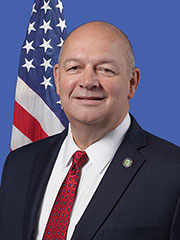The head of the Federal Aviation Administration (FAA), Stephen M. Dickson, today affirmed that the Boeing 737 MAX will only return to service following the completion of a comprehensive and rigorous review process.

Before the aircraft returns to the skies, the FAA must sign off on all technical reviews of Boeing’s proposed safety enhancements, Administrator Dickson said during testimony before the Senate Committee on Commerce, Science, and Transportation and the families of the victims of the Ethiopian Airlines and Lion Air accidents. Furthermore, Dickson pledged that he will fly the aircraft himself and must be satisfied that he would put his family aboard without a second thought before the return-to-service order is approved.
“As we have stated many times in the past, safety is the driving consideration in this process,” Dickson said. “This process is not guided by a calendar or schedule.”
The FAA is continuing to adhere to a data-driven, methodical analysis, review and validation of the modified flight-control systems and pilot training required to safely return the 737 MAX to commercial service. The FAA’s return-to-service decision will rest solely on the agency’s analysis of the data to determine whether Boeing’s proposed software updates and pilot training address the factors that led to the grounding of the aircraft.
The FAA has never allowed manufacturers to self-certify their aircraft, and Dickson stated the agency fully controls the approval process for the 737 MAX flight-control systems and is not delegating this authority to Boeing. Additionally, the FAA will retain the authority to issue airworthiness certificates and export certificates of airworthiness for all new 737 MAX airplanes manufactured since the grounding. Pilots will have received all of the training they need to safely operate the aircraft before it returns.
The following actions must take place before the aircraft returns to service:
- A certification flight test and completion of work by the Joint Operations Evaluation Board (JOEB), which includes the FAA and international partners from Canada, Europe, and Brazil. The JOEB will evaluate pilot-training needs using line pilots of various experience levels from U.S. and international carriers.
- The FAA’s Flight Standardization Board for the Boeing 737 will issue a report addressing the findings of the JOEB, and the report will be made available for public review and comment.
- The FAA and the multi-agency Technical Advisory Board (TAB) will review all final design documentation. The TAB is made up of FAA chief scientists and experts from the U.S. Air Force, NASA and Volpe National Transportation Systems Center. Â
- The FAA will issue a Continued Airworthiness Notification to the International Community providing notice of pending significant safety actions and will publish an Airworthiness Directive advising operators of required corrective actions.



